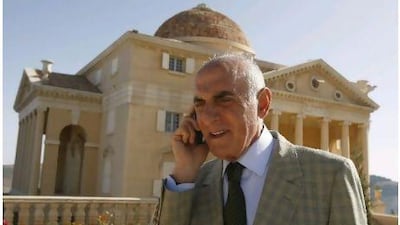NABLUS // In his hilltop palace perched above this tumbledown Palestinian city last week, the billionaire, Munib al Masri, sat before a breakfast of hummus, organic tomatoes and bowls of fresh sumac and zaatar.
Despite the fine spread, the 75-year-old self-described "Texan at heart" and putative father of Palestinian reconciliation, seemed fixated on his appetiser: four small pills on an oversized dinner plate.
"I take eight a day," to alleviate a heart condition, he said. "Not very tasty."
The chairman of the Palestinian territories' most powerful conglomerate, Palestine Development and Investment Company (Padico), spoke on a number of issues, including his grandson, also named Munib, who was nearly killed by Israeli sniper fire when he and thousands of fellow Palestinians demonstrated on Lebanon's border with Israel on May 15.
He also pondered the legacy he will leave for the Palestinian people. "Reconciliation and independence," he said. "That's what I hope."
To his many admirers, he is the indefatigable architect behind the recent rapprochement between the Gaza Strip's Hamas rulers and the Fatah faction that controls the West Bank.
On May 4, Mr Masri and a group of prominent Palestinian politicians, intellectuals and fellow businessmen finally got the enemy factions to end their bitter, four-year split during a ceremony in Cairo. The agreement sets the stage for repairing the fractured Palestinian political system and what many hope will become an independent Palestinian state.
Mamoun Abu Shahla, a Gaza businessman who worked with Mr Masri on the reconciliation accord, said: "He will be remembered always as the person who never gave up, always pushing the factions in the direction of the interests of the Palestinian people."
After four years of 18-hour days, endless phone calls and failed attempts at cajoling both factions, the agreement fills Mr Masri with pride and can still bring him to tears six weeks later.
He realises, however, that a crucial component of Palestinian independence may not be feasible for much longer.
"It's viable, but maybe not in two or three years," he said. By then, he worries, Israel's expanding Jewish settlements in the West Bank and East Jerusalem will have consumed the land necessary to sustain a state. And the settlements' accompanying control of fences, permits and checkpoints will have more thoroughly subjugated Palestinians.
"I will not be here to see it, but I could imagine it happening: the worst situation in the world, like apartheid in South Africa," he said.
Compared to the dispossessed refugees-turned-fighters of the Palestine Liberation Organisation (PLO), Mr Masri took a more privileged path to the resistance.
He studied petroleum geology at the University of Texas, where he played football and basketball, met his wife and developed affection for the Lone Star state.
He said the idea for his Palladian-styled villa atop Nablus' Mount Gerizim - part of an enormous compound adorned with neoclassical marble statues, 12,000 olive trees and an amphitheatre - came from a favourite nightclub on Chicago's Rush Street.
Mr Masrri was born in Nablus to a patrician Palestinian family, and says his first meeting with Yasser Arafat in Algiers in 1963 was uncomfortable because the Palestinian fighter "spoke with an Egyptian accent". That relationship fitfully blossomed over the years. Three of Mr Masri's six children fought with Arafat and the PLO during Israel's invasion of Lebanon in 1982.
As president of the newly created Palestinian Authority at that time, Mr Arafat was looking for Palestinian financiers. Mr Masri had the resources, much of it coming from his successful drilling and engineering company, the London-based Edgo. Mr Masri's business empire, moving from London to Nablus around the time of the signing of the Oslo Accords in 1993, began to flourish in industries ranging from property and tourism, to chemicals and food.
He said he declined Mr Arafat's offer to become Palestinian prime minister on several occasions - a position he said he still has no interest in. While hesitant to publicly criticise the late Palestinian president, Mr Masri was somewhat unflattering about Arafat's aptitude as a statesman.
"He was very honest. But he didn't care if other people around him were honest," he said, describing Mr Arafat as "a democrat, a dictator, everything - he was unique."
Frustration with Arafat and his Fatah faction, which has long been criticised by Palestinians for rampant corruption and nepotism, helped convince Mr Masri to form his own political bloc in 2007. That coalition, the Palestine Forum, never gained much political traction.
Most of his time since has been focused on convincing Hamas and Fatah to overcome their differences.
Mr Masri credits Egypt's new transitional government for providing the necessary incentives for reaching the new deal. He calls the pragmatic tone struck by Hamas's leader, Khaled Meshaal, that of a "statesman". And he believes the offer by Mahmoud Abbas, the Palestinian Authority president, on March 16 to visit Gaza was the catalyst behind the pact.
As far as his role in healing the Palestinian body politic is concerned, he said that is for history to judge.
Yet without the agreement, he believes "there is no future".
He said: "We came all this way after four years, God damn it, to bring us out of level zero. I don't want to die not seeing this basic component of the Palestinian struggle happen."

